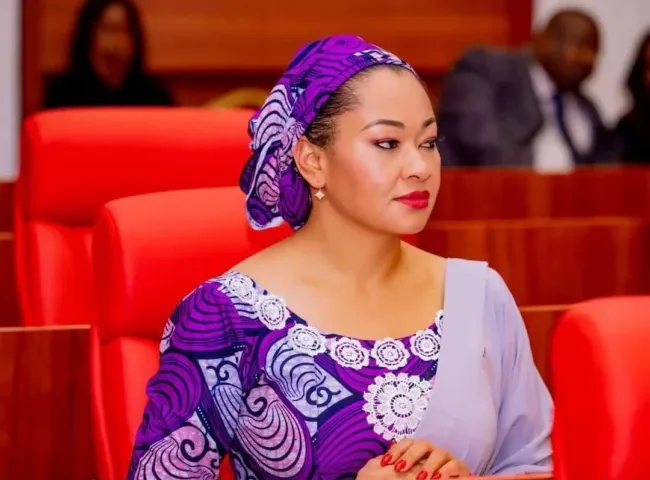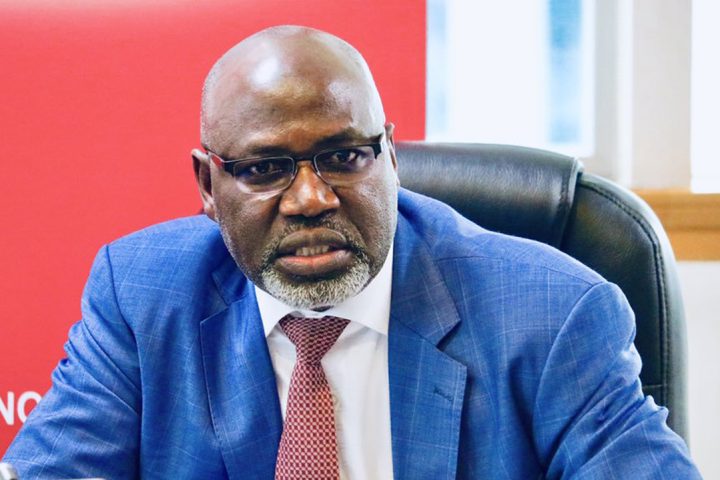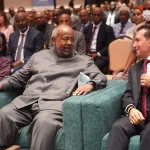Secretary of State Anthony J. Blinken in a global message which was made available to Prime Business Africa on June 6, 2023, enumerated 7 reasons why Russia’s war of aggression in Ukraine will fail.
Recall that Blinken had in Helsinki, Finland last week delivered a speech about the strategic failure of Russia’s war in Ukraine and about United States’ continued efforts to support Ukraine’s defense of its territory, sovereignty, and democracy in pursuit of a just and lasting peace.
Join our WhatsApp Channel7 Reasons Putin’s War Strategy Is A Failure – Full Text of Secretary Anthony Blinken’s Speech
Today, I want to set out the many ways Putin’s war of aggression against Ukraine has been a strategic failure, greatly diminishing Russia’s power, its interests, and its influence for years to come. And I’ll also share our vision of the path to a just and lasting peace.
When you look at President Putin’s long-term strategic aims and objectives, there is no question: Russia is significantly worse off today than it was before its full-scale invasion of Ukraine – militarily, economically, geopolitically.
Where Putin aimed to project strength, he’s revealed weakness. Where he sought to divide, he’s united. What he tried to prevent, he’s precipitated. That outcome is no accident. It’s the direct result of the courage and solidarity of the Ukrainian people and the deliberate, decisive, swift action that we and our partners have taken to support Ukraine.
Russia Has Failed To Divide NATO
First, for years, President Putin sought to weaken and divide NATO, under the false claim that it posed a threat to Russia. In fact, before Russia invaded Crimea and eastern Ukraine in 2014, NATO’s posture reflected a shared conviction that conflict in Europe was unlikely. The United States had significantly reduced its forces in Europe since the end of the Cold War, from 315,000 in 1989 to 61,000 at the end of 2013. Many European countries’ spending on defense had been declining for years. NATO’s strategic doctrine at the time labeled Russia a partner.
READ: Ukraine Faces Major Crisis As Dam Attack Triggers Massive Flooding
Following Russia’s invasion of Crimea and the Donbas in 2014, that tide began to turn. Allies committed to spend two percent of GDP on defense and deployed new forces to NATO’s eastern flank in response to Russia’s aggression. The Alliance has accelerated its transformation since Russia’s full-scale invasion – not to pose a threat or because NATO seeks conflict. NATO always has been – and always will be – a defensive alliance. But Russia’s aggression, threats, nuclear saber-rattling compelled us to reinforce our deterrence and defense.
Hours after the full-scale invasion, we activated NATO’s defensive Response Force. In the weeks that followed, several Allies – including the United Kingdom, Germany, the Netherlands, Denmark, Spain, France – swiftly sent troops, aircraft, and ships to reinforce NATO’s eastern flank. We doubled the number of ships patrolling the North and Baltic seas, and doubled the number of battle groups in the region. The United States established its first permanent military presence in Poland. And, of course, NATO added Finland as its 31st Ally, and we will soon add Sweden as the 32nd.
As we head into the NATO Summit in Vilnius, our shared message will be clear: NATO Allies are committed to enhanced deterrence and defense, to greater and smarter defense spending, to deeper ties with Indo-Pacific partners. NATO’s door remains open to new members, and it will stay open.
Russia Losing Out On Deepening Europe’s Dependence On Its Oil And Gas
Second, for decades, Moscow worked to deepen Europe’s dependence on Russian oil and gas. Since President Putin’s full-scale invasion, Europe has made a swift and decisive turn away from Russian energy. Berlin immediately canceled Nord Stream 2, which would have doubled the flow of Russian gas to Germany.
Before Putin’s invasion, European countries imported 37 percent of their natural gas from Russia. Europe cut that by more than half in less than a year. In 2022, EU countries generated a record one-fifth of their electricity through wind and solar – more electricity than the EU generated through coal, gas, or any other power source. The United States for its part more than doubled our supply of gas to Europe, and our Asian allies – Japan, the Republic of Korea – also stepped up to boost Europe’s supply.
Meanwhile, the oil price cap that we and our G7 partners put in place has kept Russia’s energy in the global market, while dramatically cutting Russian revenues. A year into its invasion, Russia’s oil revenues had fallen by 43 percent. The Russian Government’s tax revenues from oil and gas have fallen by nearly two-thirds. And Moscow will not get back the markets that it has lost in Europe.
Russia’s Military Remains the Second-strongest in Ukraine
Third, President Putin spent two decades trying to build Russia’s military into a modern force, with cutting-edge weaponry, streamlined command, and well-trained, well-equipped soldiers. The Kremlin often claimed it had the second-strongest military in the world, and many believed it. Today, many see Russia’s military as the second-strongest in Ukraine. Its equipment, technology, leadership, troops, strategy, tactics, and morale, a case study in failure – even as Moscow inflicts devastating, indiscriminate, and gratuitous damage on Ukraine and Ukrainians.
Russia is estimated to have suffered more than 100,000 casualties in the last six months alone, as Putin sends wave after wave of Russians into a meat grinder of his own making.
Meanwhile, sanctions and export controls imposed by the United States, the European Union, and other partners around the world have severely degraded Russia’s war machine and defense exports, setting them back for years to come. Russia’s global defense partners and customers can no longer count on promised orders, let alone spare parts. And as they witness Russia’s poor performance on the battlefield, they are increasingly taking their business elsewhere.
Russia Fails To Emerge As Global Economic Power
Fourth, President Putin wanted to build Russia up as a global, economic power. His invasion cemented his long-running failure to diversify Russia’s economy, to strengthen its human capital, to fully integrate the country into the global economy. Today, Russia’s economy is a shadow of what it was, and a fraction of what it could have become had Putin invested in technology and innovation rather than weapons and war.
Russia’s foreign reserves are down by more than half, as are profits from its state-owned enterprises. More than 1,700 foreign companies have reduced, suspended, or ended operations in Russia since the onset of the invasion. That’s tens of thousands of jobs gone, a massive flight of foreign expertise, and billions of dollars in lost revenue for the Kremlin.
A million people have fled Russia, including many of the country’s top IT specialists, entrepreneurs, engineers, doctors, professors, journalists, scientists. Countless artists, writers, filmmakers, musicians have also left, seeing no future for themselves in a country where they can’t express themselves freely.
World Governments Are Now De-risking On Russia
Fifth, President Putin invested considerable effort to show that Russia could be a valued partner to China. On the eve of the invasion, Beijing and Moscow declared a “no limits” partnership. Eighteen months into the invasion, that two-way partnership looks more and more one-sided. Putin’s aggression and weaponization of strategic dependencies on Russia has served as a wake-up call to governments around the world to make efforts at de-risking. And together, the United States and our partners are taking steps to reduce those vulnerabilities, from building more resilient critical supply chains to strengthening our shared tools to counter economic coercion.
So, Russia’s aggression hasn’t distracted us from meeting the challenges in the Indo-Pacific. It’s actually sharpened our focus on them. And our support for Ukraine hasn’t weakened our capabilities to meet potential threats from China or anywhere else – it’s strengthened them. And we believe that Beijing is taking notice that, far from being intimidated by a forceful violation of the UN Charter, the world has rallied to defend it.
Russia Is More Isolated Today Than Ever
Sixth, prior to the war, President Putin regularly used Russia’s influence in international organizations to try to weaken the United Nations Charter. Today, Russia is more isolated on the world stage than ever. At least 140 nations – two-thirds of UN member-states – have repeatedly voted in the UN General Assembly to affirm Ukraine’s sovereignty and territorial integrity, to reject Putin’s attempts to illegally annex Ukrainian territory, to condemn Russia’s aggression and atrocities, and to call for a peace consistent with the principles of the United Nations Charter. Governments from the West and East, North and South have voted to suspend Russia from numerous institutions, from the UN Human Rights Council to the International Civil Aviation Organization. Russian candidates have lost one election after another for key seats in international institutions, from the governing board of UNICEF to leadership of the UN agency responsible for information and communication technologies, the ITU.
Each rebuke and loss for Moscow is not only a vote against Russia’s aggression, it’s a vote for the core principles of the United Nations Charter.
Russia Fails To Estrange The West From The Rest
Seventh, President Putin, for years, sought to divide the West from the rest, claiming that Russia was advancing the best interests of the developing world. Today, thanks to openly declaring his imperial ambitions and weaponizing food and fuel, President Putin has diminished Russian influence on every continent. Putin’s efforts to reconstitute a centuries-old empire reminded every nation that had endured colonial rule and repression of their own pain. Then, he exacerbated the economic hardship many nations were already experiencing due to COVID and climate change by cutting off Ukraine’s grain from the world markets, driving up the cost of food and fuel everywhere.
By contrast, on one global challenge after another, the United States and our partners have proven that our focus on Ukraine will not distract us from working to improve the lives of people around the world and address the cascading costs of Russia’s aggression.
Our unprecedented emergency food aid has prevented millions of people from starving to death. Just last year alone, the United States provided $13.5 billion in food assistance. And the United States is currently funding over half of the UN World Food Programme’s budget. Russia funds less than one percent.
We supported a deal negotiated by UN Secretary-General Guterres and Türkiye to break Russia’s stranglehold on Ukrainian grain, allowing 29 million tons of food and counting to get out of Ukraine and to people around the world. That includes 8 million tons of wheat, which is the equivalent of roughly 16 billion loaves of bread.
Together with allies and partners, we’re mobilizing hundreds of billions of dollars in financing for high-quality infrastructure in the countries where it’s needed most and building it in a way that’s transparent, good for the environment; empowers local workers and communities.
Time and again, we are demonstrating who fuels global problems and who solves them.
Finally, President Putin’s core aim – indeed, his obsession – has been to erase the very idea of Ukraine – its identity, its people, its culture, its agency, its territory. But here, too, Putin’s actions have precipitated the opposite effect. No one has done more to strengthen Ukraine’s national identity than the man who sought to wipe it out. No one has done more to deepen Ukrainians’ unity and solidarity. No one has done more to intensify Ukrainians’ determination to write their own future on their own terms.
Ukraine will never be Russia. Ukraine stands sovereign, independent, firmly in control of its own destiny. In this – Putin’s primary goal – he has failed most spectacularly.
President Putin constantly claims that the United States, Europe, and countries that support Ukraine are bent on defeating or destroying Russia, on toppling its government, on holding back its people. That is false. We do not seek the overthrow of the Russian Government and we never have. Russia’s future is for Russians to decide.
We have no quarrel with the Russian people, who had no say in starting this tragic war. We lament that Putin is sending tens of thousands of Russians to their deaths in a war he could end now, if he chose – and inflicting ruinous impact on Russia’s economy and its prospects. Indeed, it must be asked: How has Putin’s war improved the lives, the livelihoods, or the prospects of ordinary Russian citizens?
Everything that we and our allies and partners do in response to Putin’s invasion has the same purpose: to help Ukraine defend its sovereignty, its territorial integrity and independence, and to stand up for the international rules and principles that are threatened by Putin’s ongoing war.
Let me say this directly to the Russian people: The United States is not your enemy. At the peaceful end of the Cold War, we shared the hope that Russia would emerge to a brighter future, free and open, fully integrated with the world. For more than 30 years, we worked to pursue stable and cooperative relations with Moscow, because we believed that a peaceful, secure, and prosperous Russia is in America’s interests – indeed, in the interests of the world. We still believe that today.
We cannot choose your future for you, and we won’t try to do so. But we also will not let President Putin impose his will on other nations. Moscow must treat the independence, the sovereignty, the territorial integrity of its neighbors with the same respect that it demands for Russia.
Now, as I’ve made clear, by virtually every measure, President Putin’s invasion of Ukraine has been a strategic failure. Yet while Putin has failed to achieve his aims, he hasn’t given up on them. He’s convinced that he can simply outlast Ukraine and its supporters, sending more and more Russians to their deaths, inflicting more and more suffering on Ukraine’s civilians. He thinks that even if he loses the short game, he can still win the long game. Putin is wrong about this, too.
The United States – together with our allies and partners – is firmly committed to supporting Ukraine’s defense today, tomorrow, for as long as it takes. And in America, this support is bipartisan. And precisely because we have no illusions about Putin’s aspirations, we believe the prerequisite for meaningful diplomacy and real peace is a stronger Ukraine, capable of deterring and defending against any future aggression.
We’ve rallied a formidable team around this effort. With Secretary of Defense Austin’s leadership, more than 50 countries are cooperating through the Ukraine Defense Contact Group. And we’re leading by the power of our example, providing tens of billions of dollars in security assistance to Ukraine with robust and unwavering support from both sides of the aisle in our Congress.
Today, America and our allies and partners are helping meet Ukraine’s needs on the current battlefield while developing a force that can deter and defend against aggression for years to come. That means helping build a Ukrainian military of the future, with long-term funding, a strong air force centered on modern combat aircraft, an integrated air and missile defense network, advanced tanks and armored vehicles, national capacity to produce ammunition, and the training and support to keep forces and equipment combat-ready.
That also means Ukraine’s membership in NATO will be a matter for Allies and Ukraine – not Russia – to decide. The path to peace will be forged not only through Ukraine’s long-term military strength, but also the strength of its economy and its democracy. This is at the heart of our vision for the way forward: Ukraine must not only survive, it must thrive. To be strong enough to deter and defend against aggressors beyond its borders, Ukraine needs a vibrant, prosperous democracy within its borders.
That’s the path the Ukrainian people voted for when they won their independence in 1991. It’s the choice they defended in the Maidan in 2004, and again in 2013: a free and open society, with respect for human rights and the rule of law, fully integrated with Europe, where all Ukrainians have dignity and the opportunity to realize their full potential – and where the government responds to the needs of its people, not those of vested interests and elites.
We are committed to working with allies and partners to help Ukrainians make their vision a reality. We’ll not only help Ukraine rebuild its economy, but reimagine it, with new industries, trade routes, supply chains connected with Europe and with markets around the world. We’ll continue to bolster Ukraine’s independent anti-corruption bodies, a free and vibrant press, civil society organizations. We’ll help Ukraine overhaul its energy grid – more than half of which has been destroyed by Russia – and do it in a way that’s cleaner, more resilient, and more integrated with its neighbors, so that Ukraine can one day become an energy exporter.
Ukraine’s greater integration with Europe is vital to all of these efforts. Kyiv took a giant step in that direction last June, when the union formally granted Ukraine EU candidate status. And Kyiv is working to make progress toward the EU’s benchmarks even as it fights for its survival.
Investing in Ukraine’s strength is not at the expense of diplomacy. It paves the way for diplomacy. President Zelenskyy has said repeatedly that diplomacy is the only way to end this war, and we agree. In December, he put forward a vision for a just and lasting peace. Instead of engaging in that proposal or even offering one of his own, President Putin has said there is nothing to talk about until Ukraine accepts, and I quote, “new territorial realities” – in other words, accept Russia’s seizure of 20 percent of Ukraine’s territory. Putin spent the winter trying to freeze Ukrainian civilians to death, and then the spring trying to bomb them to death. Day after day, Russia rains down missiles and drones on Ukrainian apartment buildings, schools, hospitals.
Now, from a distance, it’s easy to become numb to these and other Russian atrocities, like the drone strike last week on a medical clinic in Dnipro, which killed four people, including doctors; or the 17 strikes on Kyiv in the month of May alone, many using hypersonic missiles; or the missile attack in April on the city of Uman – hundreds of miles from the front lines – in which 23 civilians were killed. The rocket strike hit multiple apartment buildings in Uman before dawn. In one of those buildings, a father, Dmytro, raced to the room where his children were sleeping – Kyrylo, age 17; Sophia, age 11. But when he opened the door to their bedroom, there was no room, just fire and smoke. His children were gone. Two more innocent lives extinguished. Two of the six children Russia killed in a single strike. Two of the thousands of Ukrainian children killed by Russia’s war of aggression. Thousands more have been wounded, and thousands beyond that have been abducted from their families by Russia and given to Russian families. Millions have been displaced. All are part of a generation of Ukrainian children terrorized, traumatized, scarred by Putin’s war of aggression, all of whom remind us why Ukrainians are so fiercely committed to defending their nation and why they deserve – deserve – a just and lasting peace.
The United States has been working with Ukraine – and allies and partners around the world – to build consensus around the core elements of a just and lasting peace. To be clear, the United States welcomes any initiative that helps bring President Putin to the table to engage in meaningful diplomacy. We’ll support efforts – whether by Brazil, by China, or any other nation – if they help find a way to a just and lasting peace, consistent with the principles of the United Nations Charter.
Here’s what that means
A just and lasting peace must uphold the UN Charter and affirm the principles of sovereignty, territorial integrity, and independence.
A just and lasting peace requires Ukraine’s full participation and assent – nothing about Ukraine without Ukraine.
A just and lasting peace must support Ukraine’s reconstruction and recovery, with Russia paying its share.
A just and lasting peace must address both accountability and reconciliation.
A just and lasting peace can open a pathway to sanctions relief connected to concrete actions, especially military withdrawal. A just and lasting peace must end Russia’s war of aggression.
In the weeks and months ahead, the United States will continue to work with Ukraine, with our allies and partners – and any and all parties dedicated to supporting a just and lasting peace based on these principles.
On April 4, 1949, 74 years to the day before Finland joined NATO, the original members of the Alliance gathered in Washington to sign its founding treaty. President Truman warned the group, and I quote, “We cannot succeed if our people are haunted by the constant fear of aggression and burdened by the cost of preparing their nations individually against attack. [W]e hope to create a shield against aggression and the fear of aggression – a bulwark which will permit us to get on with the real business of . . . achieving a fuller and happier life for all our citizens.”
The same is true today. No nation – not Ukraine, not the United States, not Finland, Sweden, any other country can deliver for its people if it lives in constant fear of aggression. That’s why we’ve all got a stake in ensuring that President Putin’s war of aggression against Ukraine continues to be a strategic failure.
Thank you very much.
appreciate those who have taken the time to write to me in the past several months. To share your thoughts, please write to me and my team at EmailTeam@State.gov.
Sincerely,
Secretary Antony J. Blinken

















Follow Us